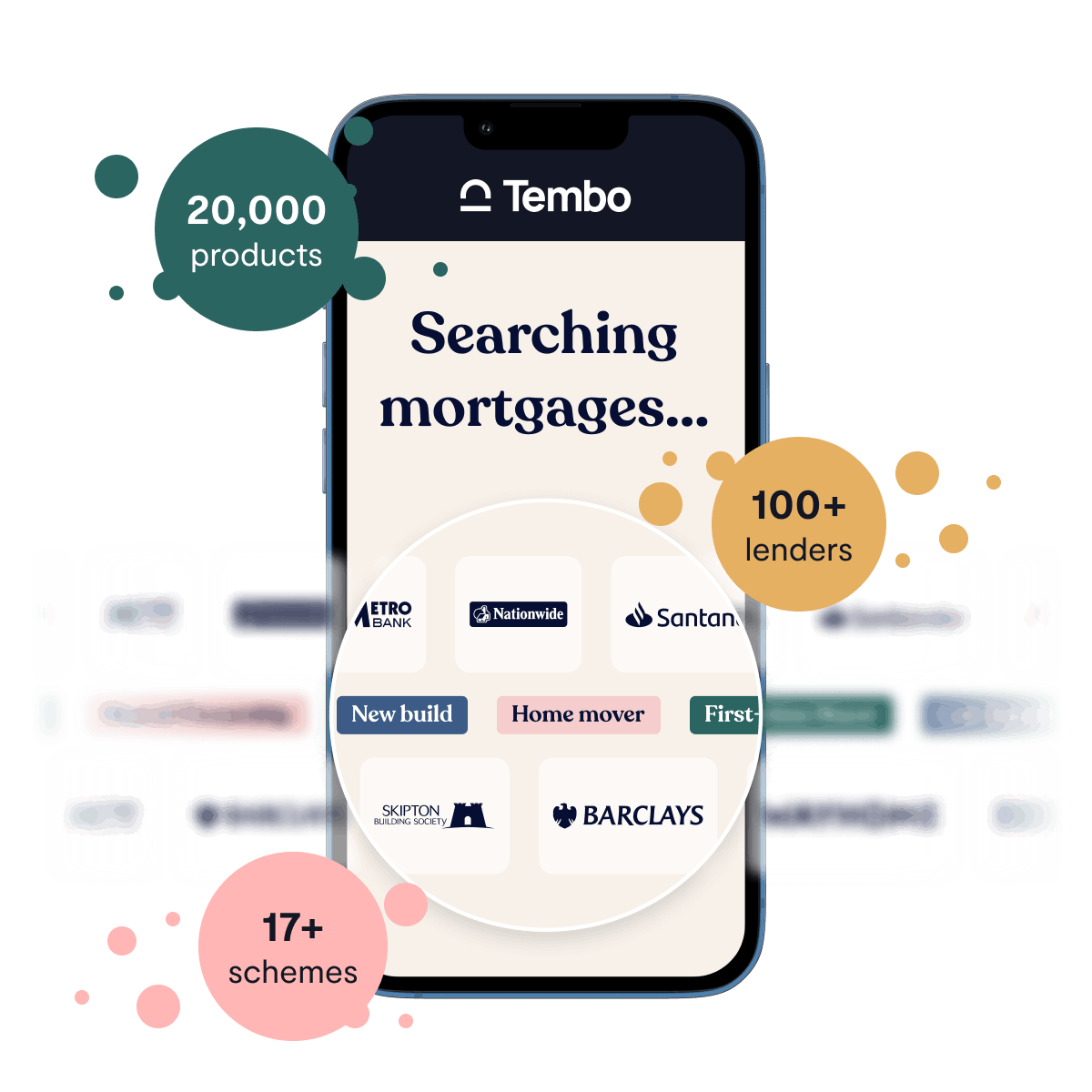Can I get a mortgage?
Mortgage eligibility can be a confusing topic. How do you know if you qualify for a mortgage, or what you could be offered? Why might you get rejected, and what do you do if this happens? In this article, we’ll answer all your burning questions about mortgage eligibility.
In this guide
- Am I eligible for a mortgage?
- How do you find out if I would qualify for a mortgage?
- How is mortgage eligibility determined?
- What salary do you need to get a mortgage?
- Can I improve my chances of getting a mortgage?
- Is it common to be refused a mortgage?
- Why am I not eligible for a mortgage?
- How do I prove my mortgage eligibility?
- What age is it harder to get a mortgage?
Am I eligible for a mortgage?
It can seem like it’s difficult to know if you’re eligible for a mortgage without applying, particularly when there are so many options out there. However this is why mortgage brokers exist, and it’s why digital fact finds are so important, as they help you understand what you could be eligible for before actually signing on the dotted line.
At Tembo, our online Fact Find will give you a view to your eligibility in under 10-minutes, scanning over 100 lenders and over 20,000 mortgage products. This isn’t a green tick though: the next step is to speak to one of our mortgage advisors and get a Decision in Principle underway. This is a nod from a specific lender that they may be willing to lend to you and how much, based on the information you’ve provided.
Find out more: What to do if my mortgage application is declined?
How do you find out if I would qualify for a mortgage?
The easiest way to find out if you would qualify for a mortgage is to work with a reputable, trusted mortgage broker who specialises in affordability, like us. We’ll be able to show you what you could be offered for a mortgage, how you could boost your borrowing potential, and find the right deal for you from across our panel of over 100 lenders and over 20,000 mortgage products.
How is mortgage eligibility determined?
Mortgage eligibility is influenced by a combination of factors that determine whether you qualify for a mortgage or not and the terms you'll be offered. For example, some mortgages are only for first time buyers, or those with certain jobs like NHS or key workers or other professional roles. To make it more complicated, mortgage eligibility changes from one lender to another based on what products they offer, and the requirements they set.
You might also like: How much can I borrow for a mortgage?
Find out more: Mortgages for professionals and key workers.
See what you could be offered today
To see what you could be offered for a mortgage, the quickest way is to use our Mortgage Calculator to get a rough estimate, or get a personalised recommendation for free by creating a Tembo plan.
Here are the key factors that affect mortgage eligibility:
1. Credit score
Your credit score is a critical element that lenders consider when evaluating your eligibility for a mortgage. A higher credit score typically indicates a history of managing debt responsibly, making you a more attractive borrower to lenders. While a lower score will make you seem like a riskier borrower to lenders; you will likely to offered higher interest rates as a result and you may also need to put down a larger deposit.
Luckily, there are ways to improve your credit score - read our guide on credit here to learn more.
To check your credit rating across the three main credit referencing agencies used and trusted by lenders, get a report using CheckMyFile.
2. Income and employment history
Lenders assess your income and employment history to ensure you have a stable source of funds to repay the mortgage. A consistent income and a secure job history can strengthen your eligibility. It will also help to determine how much a lender is willing to lend to you, which is a big part of your mortgage affordability. Typically, you can borrow between 4 to 4.5 times your household income for a mortgage. Some people, such as nurses, doctors, teachers or higher earners can qualify for 5.5 or even 6.5 times their income.
If you are self-employed or have multiple income sources, you may find it harder to qualify for a mortgage. This is because a lender will want evidence of your income. For example, if you’re self-employed through a limited company, you may have to provide 2-3 years worth of accounts, or your most recent profit figure. While self-employed sole traders will be asked for their SA302s and a tax year overview. Like other borrowers, you'll also need to supply your latest three months’ bank statements.
Read more about self-employed mortgages here.
3. Debt-to-Income Ratio
When assessing your eligibility for a mortgage, lenders don’t just look at what money is coming in each month. They also look at your debt-to-income (DTI) ratio. This is a measure of your existing debt compared to your income. A lower DTI ratio indicates you are financially more able to handle additional debt (i.e. a mortgage loan), which can positively impact your eligibility when applying for a mortgage.
Top tip
In the lead up to a mortgage application, if you can it’s a good idea to reduce any outstanding debts, like cars on finance or personal loans.
4. Down Payment
The size of your down payment (a.k.a the deposit you put down) significantly affects your eligibility for a mortgage. The bigger down payment put down, the less you need to borrow for a mortgage to purchase a property. This makes you a less risky borrower, so lenders will be more willing to approve your mortgage application and offer you lower interest rates.
This is typically expressed as your loan-to-value ratio, or LTV, which compares the loan amount to the value of the property. Lenders will typically specify the LTV requirements for their different mortgage products. For example, they may only accept applicants with LTVs of 80% or less, although you can find schemes that accept 5% deposits.
We’re experts in mortgage eligibility
Different lenders have varying eligibility criteria, so it can be difficult to know which lenders or mortgage products to apply for. At Tembo, we specialise in helping buyers and remortgagers find the right mortgage for them from across the market - so you don’t have to.
What salary do you need to get a mortgage?
As a general rule, you don’t need a specific salary to get a mortgage, although for some mortgage products lenders do specify you need to earn a certain amount to qualify. To get a mortgage, you need to be financially reliable, and be able to afford the mortgage repayments. This is why the amount you can borrow for a mortgage is based on how much you earn, so the lower your salary the less you will be able to borrow for a mortgage.
However, there are ways to boost your borrowing power, which is something we specialise in here at Tembo. Our mission is to make homeownership accessible to as many people as possible by showing you how you could boost mortgage affordability. To get a personalised recommendation, create a free Tembo plan today.
Can I improve my chances of getting a mortgage?
Yes, there are things you can do to improve your chances of getting a mortgage. For example, you could take steps to improve your credit score, save up a larger deposit, or get help from a loved one through a guarantor mortgage.
Working with a specialist mortgage broker like Tembo can help you discover ways to improve your mortgage eligibility, as well as ensure that you apply for a mortgage and lender that is right for you. See what you could be offered today here.
Is it common to be refused a mortgage?
It's common to be refused a mortgage as certain mortgage products can have very specific eligibility criteria. Plus, lenders are tightening their affordability rules because of high inflation, which has caused higher mortgage rates and the cost of living to be more expensive. Lenders want to ensure they are not offering mortgage loans to borrowers who can’t afford to repay the debt, so when mortgages are more expensive this makes it harder to pass lenders’ affordability checks.
If you’re worried about being rejected from a mortgage application, or have already had an application declined, don’t worry. We’re experts in helping buyers and remortgagers to boost their mortgage affordability, so they can be accepted for a mortgage and buy a new home, or move onto a new deal.
See what you could afford today with a personalised Tembo plan.
Why am I not eligible for a mortgage?
There can be a variety of reasons why you may not be eligible for a mortgage. It could be your credit score is too low, you haven’t got enough saved up as a house deposit, or your earnings or outgoings will make affording the mortgage you want difficult. Some mortgage products are also designed for specific applicants, so have particular criteria like being a first time buyer, working in a certain profession, or earning over a certain amount.
If you’ve been rejected for a mortgage before, or have been told your mortgage affordability isn’t enough to get the mortgage you need, talk to Tembo. The majority of our customers have been turned down previously by a broker or lender. See what you could afford today by creating a free Tembo plan.
How do I prove my mortgage eligibility?
To prove you're eligible for a mortgage, you have to supply evidence of your income, outgoings and credit history. This is normally done by providing documents like bank statements, a credit report and proof of identity. If you’re self-employed, you may be asked to provide 2-3 years' worth of accounts or your most recent profit figure. Sole traders will need to provide a Self Assessment Tax Calculation (SA302) form and a tax year overview. You will also need to supply your latest three months’ bank statements, like other borrowers.
When you get a mortgage with Tembo’s help, your dedicated mortgage adviser will let you know what documentation is needed and when.
What age is it harder to get a mortgage?
Mortgage eligibility isn't solely determined by age, but older applicants may find it harder to be accepted for a mortgage loan. This is because mortgage lenders will normally specify what age the oldest borrower must be when the mortgage loan should finish, typically between 70 years old.
Securing a mortgage is a crucial step toward homeownership, but the path isn't always straightforward. A lot of people face hurdles related to mortgage eligibility and affordability, leading them to wonder if they can get a mortgage at all. At Tembo, we specialise in helping buyers, movers and remortgagers overcome exactly these types of problems.
See what you could afford today, as well as what mortgage rates you could be offered by creating a free Tembo plan.
Why Tembo?




